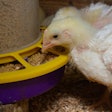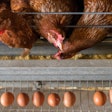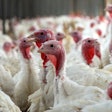
As regulations surrounding the use of antibiotics in animals change, a leading mind in the field of antibiotic resistance urges the poultry industry to be good stewards of the powerful tools.
On Tuesday at the International Production & Processing Expo in Atlanta, Georgia, Dr. Randall Singer, a professor of epidemiology at the University of Minnesota’s Department of Veterinary and Biomedical Sciences, spoke about how the use of antibiotics contributes to the development of antibiotic resistant pathogens.
In his presentation, Singer discussed how changing attitudes and regulations toward the use of antibiotics to prevent disease in flocks and herds could affect animal and human health over the long term. The fear, he said, is that widespread use of antibiotics in animals is contributing to the creation of antibiotic-resistant pathogens which could eventually affect human health and reduce the overall efficacy of medically important antibiotics.
While the issue has attracted scrutiny around the world, there’s a lack of research on how the use of antibiotics in animals affects the development of antibiotic-resistant pathogens. Singer, who’s served on national advisory boards focusing on the topic, said his biggest concern is good stewardship and responsible antibiotic use.
Singer said research indicates high doses of antibiotics administered over a short period of time, the conventional way of using the antimicrobials, may be contributing to the proliferation of antibiotic-resistant pathogens. Recent studies in animals have shown that practice is eradicating all bacteria except for the antibiotic-resistant pathogens. While he supports the U.S. Food and Drug Administration’s forthcoming Veterinary Feed Directive regulations and thinks antibiotic use should be supervised by veterinarians, there’s the possibility that kind of treatment could contribute to the development of antibiotic-resistant microbes.
“It’s possible that we will use (antibiotics) responsibly, and yet make the resistance situation worse,” Singer said in an interview after his presentation.
Singer said research also indicates long-term use of low doses of antibiotics, such as those used for growth promotion, may not be contributing to antibiotic resistance, but rather keeping the amount of antibiotic resistant bacteria stable. Empirical evidence from Europe, where some countries have already banned the use of antibiotics from growth promotion, suggests there could be more antibiotic resistance in animals after the use of those antibiotics ceases.
In order to better understand that issue, more research and more data must be collected on the topic. Singer said it’s hard to find the money to conduct the studies. In the U.S., the majority of the federal funding is dedicated toward understanding antibiotic resistance related to human health rather than animal health.
Singer also said more research must be done in order to better understand where antibiotics wind up after they are given to animals. The industry will need to pay closer attention to antibiotic presence in urine and feces and consider how those waste products are used, he said, especially if new regulations governing disposal of waste arise in the future.
Singer, in collaboration with trade groups like the U.S. Poultry and Egg Association and the National Chicken Council, is launching a new voluntary and confidential survey to understand how broiler and layer farmers use antibiotics. The survey, he said, will help the industry collect real data on how antibiotics are being used and which antibiotics farmers are using. He urged the poultry industry to participate and take the lead on the issue.
“Antibiotics are an incredibly important piece of our arsenal for maintaining animal health,” Singer said. “What we don’t want is to see them disappear, and one way you do that is by documenting that they are being used responsibly and you can demonstrate stewardship.
“I fear the day where we don’t have any antibiotics left to maintain animal health. Already poultry has very few compared to beef and swine. If that number continues to dwindle that would be a scary day for us.”
















